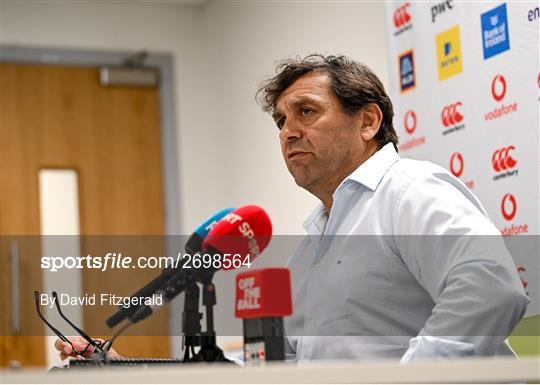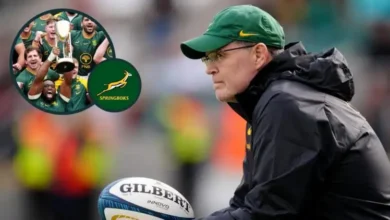‘Performance anxiety wasn’t a factor’ – David Nucifora gives his verdict on World Cup exit

What went wrong on that night in Paris when Ireland’s dreams came crashing down around them against the All Blacks?
Andy Farrell has opted not to interact with the media since conducting his post-match press conference at the Stade de France on October 14, while the IRFU had kept its counsel until yesterday’s end-of-year briefing with David Nucifora in Abbotstown.
Just before the Australian performance director walked into the room, the union released news that the coach had signed a new deal that would take him to the 2027 World Cup.
It was a classic PR move, designed to focus on the future and limit the awkward questions that come when the best-resourced team in Irish rugby history exit the competition at the same stage as in most previous tournaments.
Nucifora was happy to offer his thoughts on the campaign that concluded with Ireland going through an unending succession of phases before Sam Whitelock earned a ruck penalty and Wayne Barnes sent them home. The evaluation is not yet complete.
Since the IRFU doesn’t release its reviews, fans will have to settle for Nucifora’s analysis of the game’s positive and negative aspects.
He took advantage of Ireland’s historic quarterfinal loss in 2015 to impose adjustments on player mobility and foreign player signings that were reducing Ireland’s depth in vital areas.
Four years later, he split the blame between Joe Schmidt’s unwillingness to evolve Ireland’s game plan and the players’ state of psychological preparation as he coined the phrase “performance anxiety”.
That phrase has lingered over the team since, and when they made several uncharacteristic errors in the opening quarter against New Zealand, it came to mind again.
Nucifora clearly believes this year’s exit was different and “performance anxiety” wasn’t an issue for the players.
“No, not at all. Not at all. You only have to look at the quality of the performances for the 15/16 months leading up to that. It wasn’t an issue. I mean, it’s a game of rugby and you’ve got four teams at the moment in the world who on any given day could beat each other if you played them multiple times,” he said.
“There’s probably two instances in that game where the ball might have bounced differently, or we might have made a different decision about a certain time we decided to do something, and that’s probably the difference between winning and losing that game.
“I certainly don’t relate that to performance anxiety in any way, shape or form. It’s a high-level international rugby match with fine margins, and unfortunately, that’s the way that game panned out.”
One thing that was thrown at Farrell afterwards was the decision to field the same group of players over and over again, with Rassie Erasmus questioning the strategy in the days after Ireland had gone home.
“We examined it, but it was evidently a tactic we employed to achieve that,” Nucifora stated.
“We just decide to do something on the day that we plan to do it. We knew exactly how we wanted to approach that. Our players could handle the weights that were put on them because they were in excellent shape.
Being able to go on a roll like that and maintaining team cohesion may be quite essential at times. Thus, occasionally you may decide to declare, “All right, I’ll just choose to play for a different team.” And those choices were made by other teams.
“But I think we’re really comfortable with the decisions we made around how we use the game-time of all of our
players, therefore I doubt we would consider that. We don’t consider it to be the reason we fell short against New Zealand by a few points.
Ireland’s aspirations were further hampered by their lineout problems. “I don’t think it was a failure per se, but I think we weren’t as consistent as we would have liked to be at times due to the consistency of the lineout,” Nucifora stated.
“I firmly believe that after speaking with Paul O’Connell, the caliber of lineout defense in the match is rising, and he is now examining this matter very carefully.
“As for how to get ahead of that, it’s similar to the rest of the game in that as it progresses, there will be moments when attack is well ahead of defense before the defense catches up.
“The current state of the game’s lineout defense has improved, and in order to move ahead, we need to figure out how to strengthen our lineout attack.”
Based on Farrell’s recent contract extension, Nucifora believes they did not make many mistakes.
“Our reviews can often show us that we’re actually on the right track, but there will be little things that come out of the report that give us an indication about what we can be working on.”



